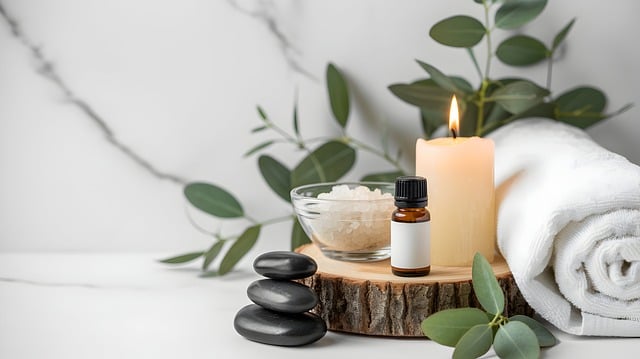Stress management through mindfulness and meditation workshops is a powerful tool for improving physical and mental health. These sessions, incorporating guided visualizations, breathwork, and yoga, create a safe space for self-exploration and community building. Regular daily practice of 10-15 minutes reduces stress levels, enhances well-being, and promotes emotional balance. Digital apps and journaling help establish a sustainable routine, allowing individuals to prioritize mindfulness and meditation for long-term balanced living.
“Unwind, rejuvenate, and discover the secrets to managing stress with our comprehensive guided workshops. In today’s fast-paced world, prioritizing wellness is essential, and our program aims to empower individuals to navigate life’s challenges with resilience.
This article explores the transformative power of mindfulness and meditation sessions, offering insights on their impact and how to structure engaging workshops. From understanding stress’s profound effects to practical techniques and sustainable post-workshop strategies, we guide you through every step.”
- Understanding the Impact of Stress and the Power of Wellness Practices
- Designing Engaging Mindfulness and Meditation Workshops
- Practical Techniques for Effective Stress Relief Through Guided Sessions
- Creating a Sustainable Wellness Routine: Post-Workshop Follow-Up Strategies
Understanding the Impact of Stress and the Power of Wellness Practices

Stress is a universal experience, but its impact on our lives can be profound. In today’s fast-paced world, many individuals struggle with managing chronic stress, which can lead to various physical and mental health issues. Understanding the toll that stress takes on our bodies and minds is the first step towards making positive changes. By recognizing the symptoms and effects of prolonged stress, we become more motivated to prioritize wellness practices.
Guided workshops on wellness and stress relief offer a transformative experience. Through mindfulness and meditation sessions, participants learn powerful tools to navigate life’s challenges. These practices encourage individuals to connect with their inner selves, fostering a sense of calm and resilience. By incorporating such techniques into daily routines, one can significantly reduce stress levels and enhance overall well-being.
Designing Engaging Mindfulness and Meditation Workshops

Designing engaging mindfulness and meditation workshops is an art that goes beyond simply teaching relaxation techniques. Effective workshops should create a safe, welcoming environment where participants feel comfortable exploring their inner selves. Incorporate interactive elements like guided visualizations, breathwork exercises, and gentle yoga to cater to diverse learning styles and keep energy levels high. Using props such as candles, essential oils, or soothing music can enhance the sensory experience, making each session memorable.
Curate a balance of structure and flexibility. While following a structured plan ensures participants get the most out of each lesson, allow for spontaneity to cater to individual needs. Encourage participants to share their experiences and insights through discussions or journaling activities. This fosters a sense of community and reinforces the benefits of mindfulness and meditation sessions long after the workshop ends.
Practical Techniques for Effective Stress Relief Through Guided Sessions

Guided workshops on wellness and stress relief offer a powerful tool for navigating life’s challenges. These sessions, often incorporating mindfulness and meditation techniques, empower participants with practical tools to manage stress effectively. During these calming experiences, instructors lead individuals through focused breathing exercises, progressive muscle relaxation, and visualization scenarios designed to promote mental clarity and emotional balance.
Regular participation in mindfulness and meditation sessions can significantly reduce levels of cortisol, the body’s primary stress hormone. By cultivating a present-moment awareness, individuals learn to let go of anxious thoughts about the past or future, fostering a deeper sense of inner peace. This, in turn, enhances overall well-being, improves sleep quality, and boosts resilience against stressors, making guided workshops valuable resources for anyone seeking balanced living.
Creating a Sustainable Wellness Routine: Post-Workshop Follow-Up Strategies

After participating in a guided workshop on wellness and stress relief, creating a sustainable routine is key to maintaining the benefits gained during the session. To reinforce what was learned, individuals should incorporate regular mindfulness and meditation practices into their daily lives. Even short, daily dedications of just 10-15 minutes can significantly reduce stress levels over time.
Post-workshop, participants can leverage digital tools like guided meditation apps to support their journey. Additionally, setting reminders for specific times dedicated to relaxation and self-care ensures these practices become ingrained in one’s schedule. Keeping a journal to track progress and reflect on feelings throughout the day can also be beneficial. Regularly reviewing one’s wellness routine allows for adjustments and personalisation, fostering long-term adherence to a healthier, more balanced lifestyle.
Guided workshops on wellness and stress relief, focusing on mindfulness and meditation sessions, offer a powerful tool for navigating life’s challenges. By integrating practices from the article’s sections—from understanding stress impact to practical techniques and sustainable routines—individuals can find peace and enhance their overall well-being. These workshops not only equip participants with valuable skills but also serve as a catalyst for long-term mental health management.
